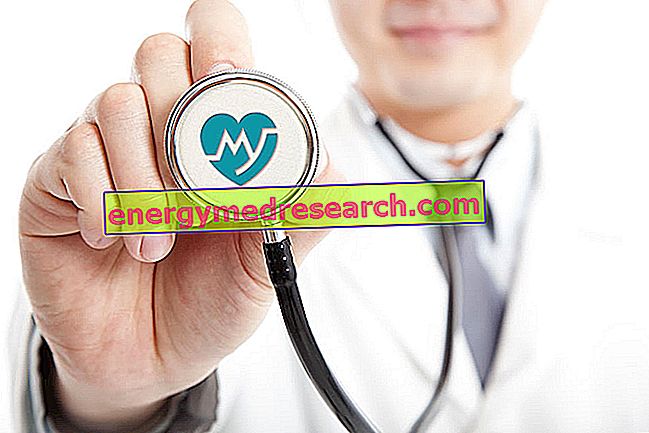Definition
Literally, the term "angina pectoris" refers to "chest pain": we are talking about a complex syndrome characterized by intense pain at the level of the retro sternal site, which often spreads also to the shoulders, neck, jaw and left arm .
Angina pectoris occurs when the demand for blood from the heart exceeds that available (in the coronary circulation).
Causes
Coronary atherosclerosis and secondary myocardial ischemia are the two main predisposing factors for angina pectoris: in fact, myocardial blood supply can be reduced due to the presence of an atheroma lodged in a coronary artery. It is observed that the pain in the chest, in the context of angina pectoris, is generally consequent to a more or less intense effort, while it tends to relieve itself during rest.
Symptoms
Characteristic of angina pectoris is chest pain, oppressive and constrictive, similar to a vice: pain tends to gradually reduce with rest. Sometimes, the pain also radiates to nearby areas (jaw, throat, stomach) and is not affected by breathing. Other symptoms associated with angina pectoris include anxiety, heartburn, heart disease, weakness, dyspnea, nausea, sweating, vomiting.
Information on Angina - Medicines for the Treatment of Angina Pectoris is not intended to replace the direct relationship between health professional and patient. Always consult your doctor and / or specialist before taking Angina - Drugs for the Treatment of Angina Pectoris.
drugs
The correction of risk factors and the implementation of simple behavioral rules can reduce the risk of angina occurring:
- Avoid sedentariness: practice constant exercise every day
- Avoid a diet rich in lipids and simple sugars: follow a low-calorie diet
- Not smoking
- Avoid alcohol
- If necessary, follow a pharmacological treatment for the metabolic syndrome, one of the most dangerous predisposing factors for cardiovascular diseases in general and angina pectoris in particular.
The goal of treatment for angina (especially in its stable form) is the prevention of myocardial infarction and death: for this reason, it is essential to minimize the occurrence of ventricular changes and thrombosis.
Angina pectoris can be treated with sublingual NITROGLYCERINE, possibly associated with a BETABLOCKING drug (if the patient is suffering from mild stable angina without left ventricular dysfunction). Beta blockers improve exercise tolerance, reduce the typical symptoms of angina and decrease the work of the heart; it is recommended not to stop the treatment abruptly with these drugs, since similar behavior could exacerbate angina. In some cases, it is necessary to associate a CALCIO ANTAGONISTA drug with a beta-blocker, to eventually replace it with a long-acting nitrate.
For some patients, beta-blockers may be unsuitable, especially in the event of loss of left ventricular function: in this case, it is recommended to take calcium channel blockers, such as diltiazem or verapamil, possibly associated with a nitrate.
Also the PIASTRINIAN ANTI-AGGREGATES (eg acetylsalicylic acid) are widely used in therapy for the prevention of angina pectoris.
Statins are indicated to minimize the possibility of cardiovascular disease in patients at risk; for long-term angina prevention, a cure with nicorandil, a calcium channel activator with a nitrate component, is recommended.
If even the drugs were not sufficient to ward off chest pain and to avoid the complications of angina pectoris, it is possible to proceed with a surgical procedure, such as the insertion of an aortocoronary bypass or angioplasty.
Beta-blockers for the treatment of angina pectoris : the function of these drugs is exercised at the level of the beta receptors of the adrenergic complex system (target: bronchi, liver, pancreas, peripheral vessels, heart). Many beta-blocking drugs are available in slow-release products, so it is often (although not always) necessary only a daily administration; those with a shorter duration of action require 2-3 administrations over a 24-hour period. Beta-blockers can promote asthma, myocardial depression and slow heart rate: not recommended in patients with marked unstable heart failure, asthma and bronchospasm.
- Atenolol (eg Atenol, Tenoretic, Tenormin): it is recommended to start therapy with a dose of 50 mg of active ingredient a day; in case of no response after 7 days of therapy, it is possible to take 100 mg of drug once a day. Consult your doctor before taking this medicine.
- Nadolol (eg. Corgard): start therapy for angina pectoris with a dose of 40 mg of drug, once a day. The maintenance dose can increase up to 80 mg, always taken once a day. Do not exceed 160-240 mg per day.
- Labetalol (eg. Trandate, Ipolab): the drug, more suitable for the treatment of hypertension, can also be taken in the treatment of angina pectoris: starting therapy with a dose of 15 mg / hour, to be gradually increased. Do not exceed 120 mg per hour.
- Acebutolol hydrochloride (eg Prent, Sectral): for the treatment of angina pectoris, it is recommended to start therapy with an active dose of 400 mg, once a day (or 200 mg, twice a day). In severe angina, take 300 mg of the drug three times a day. Do not exceed 1200 mg per day. Consult your doctor.
- Metoprolol Tartrate (eg. Seloken, Lopresor, Metoprolol AGE): for the prophylaxis of angina pectoris, take 100 mg of the drug in a single dose or in two divided doses; for the maintenance dose, take 100-450 mg of active ingredient per day. Maintain the same dosage for the treatment of angina pectoris.
- Carvedilol (eg Colver): administered in doses of 6.25 mg, to be taken orally, twice a day, on a full stomach. The maintenance dose can be increased up to 25 mg, always taken in a double daily dose. Consult your doctor.
- Timolol Maleato (eg. Blocadren, Cusimolol, Ialutim): start therapy with a dose of drug equal to 10 mg, to be taken orally twice a day; the maintenance dose for angina treatment involves taking 10-20 mg of the drug twice a day.
Nitrates for the treatment of angina pectoris : by reducing venous return, these drugs lighten the workload at the level of the left ventricle.
Most common side effects: postural hypotension, hot flushes, headache
- Nitroglycerin (eg Venitrin T for infusion, Trinitrina for infusion, Natispray Spray, Triniplas plasters, Trinitrina coated tablets): excellent drug for the treatment of symptoms related to angina pectoris; however, its therapeutic effect is rather short (it lasts about 20-30 minutes from intake). In the form of sublingual tablets, it is recommended to take a dose of drug varying from 0.3 to 0.6 mg, to be placed under the tongue: proceed with a further application, if necessary, every 5 minutes. In the form of a lingual spray, it is recommended to apply 1-2 sprays on the tongue or under the tongue every 3-5 minutes, as needed, for no more than 3 sprays in 15 minutes. The duration of action can be prolonged with the intake of nitroglycerin preparations via the transdermal route, although in this case, the chances of developing tolerance increase very much. Furthermore, nitroglycerin can also be taken by continuous intravenous infusion: start with 5 mcg per minute, increasing the dose by another 5 mcg / min every 3-5 minutes, up to 20 mcg per minute. Subsequently, it is possible to increase the dosage from 10 to 20 mcg per minute, up to a maximum of 200-400 mcg per minute. Consult your doctor.
- Isosorbide dinitrate (eg. Carvasin, Dinike, Nitrosorbide): the drug is active if formulated as sublingual tablets and is indicated for patients with mild angina pectoris (requiring occasional nitrate administration). In ischemic manifestations, the drug is also indicated as tablets to be taken orally. Unlike nitroglycerin, the therapeutic effect is not immediate, but the duration of action is clearly longer (a few hours). When the drug is ineffective in its sublingual form, it is indicated if taken intravenously. Indicatively, for the prevention of angina pectoris episodes, it is recommended to take a dose varying from 30 to 120 mg of drug divided into several doses over 24 hours. For an IV injection, take the drug at a dose of 2-10 mg per hour. Do not exceed 20 mg per hour. Also available for aerosol sprays, in this case it is advisable to spray 1-3 doses of 1.25 mg under the tongue.
- Isosorbide mononitrate (eg Duronitrin, Elan, Ismo, Diffutab, Ismo-20, Leicester, Monocinque, Monoket, Vasdilat): particularly indicated for angina prophylaxis: administer isosorbide mononitrate at a dose of 1-3 mg, three times per day for mild or medium forms, to be increased up to 5 mg for severe angina. For the treatment of angina: orally, take 2 mg (max. 3) a day; sublingually, take 0.3-1 mg of drug, to be repeated when necessary. The drug can also be found by intravenous infusion: in this case, administer 10-200 mcg of active per minute.
Nicorandil (eg Ikorel, precond): the drug is an activator of potassium channels, characterized by a nitrate component: it is indicated both for the prevention and treatment of angina pectoris, thanks to its vasodilatory properties (action on veins and arteries). The drug is not marketed in Italy. The active ingredient is administered intravenously or per os. Do not take in combination with drugs to treat erectile dysfunction (eg Viagra).
Calcium channel blockers for the treatment of angina pectoris : they act positively in the treatment and prevention of angina pectoris by dilating the blood vessels, also influencing the muscle cells of the arterial walls: increasing and favoring the flow of blood to the heart, the possibility of episodes of angina pectoris.
- Verapamil (eg. Isoptin, Kata): the drug is available in immediate-release tablets: start therapy with an active dose of 80-120 mg, to be taken three times a day; alternatively, take 40 mg of the drug, 3 times a day. The exact maintenance dose depends on the response to the cure, and can possibly be increased daily or weekly. Consult your doctor. The drug is also available in the form of slow-release tablets: for the treatment of angina pectoris, start therapy with a dose of 180 mg, to be taken orally, before going to bed. Also in this case, the maintenance dose should be established based on the response to the cure.
NOTE: in the case of presumed or ascertained ischemic heart disease, Verpamil associated with a beta-blocker drug, greatly increases the risk of heart failure!
- Amlodipine (eg Abis, Natam, Makadip, Pressac): for the treatment of chronic stable or vasospastic angina, it is recommended to take 5-10 mg of oral active, once a day.
- Diltiazem (eg. Altiazem, Tildiem, Diladel): at a dose of 30-60 mg, to be taken 3-4 times a day, the drug is indicated for the initial prophylaxis of angina pectoris. It is possible to increase the dosage up to 180-360 mg per day (divided into several doses, for maintenance therapy).
Antiplatelet agents for the treatment of angina pectoris : acetylsalicylic acid and heparin are the two most active anticoagulant active ingredients for the prevention of angina pectoris
- Acetylsalicylic acid (eg Aspirin, Cardioaspirin, Aspirinetta): the drug is used both for the treatment of episodes of angina pectoris, and in its prevention: in the first case, it is recommended to start therapy with a dose varying from 75 to 325 mg, to be taken within the shortest possible time from the confirmed diagnosis of the disease. Therapy should be continued for life. The same dose is considered for the prevention of angina pectoris. The precise dose should always be established by the doctor based on the severity of the patient's condition.
- Heparin (eg. Heparin Cal Acv, Heparin Sod.Ath, Ateroclar, Trombolisin): the drug is successfully used in therapy for unstable angina, often associated with acetylsalicylic acid. Indicatively, for the treatment of angina pectoris, take 5000 IU of drug once a day (bolus infusion), followed by 1000 units per hour (for continuous infusion). Dalteparin (eg Fragmin) should be taken subcutaneously, and requires a reduced frequency of administration compared to heparin (common): the drug is available in doses ranging from 2500IU / 0.2ml, up to 18000IU / 0.72 ml. The dosage for the treatment and prophylaxis of angina is exclusively medical.



